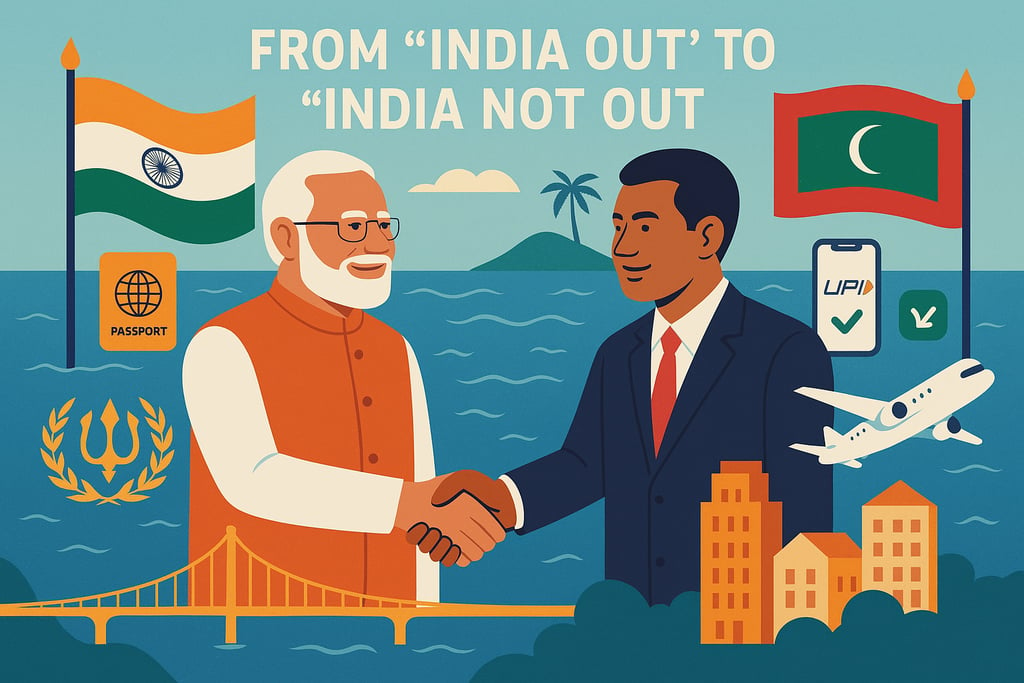Strategic Serenity: Reclaiming Trust in Island Diplomacy
A Diplomatic Whirlwind in the Indian Ocean
Nagarjun
7/26/20254 min read


From “India Out” to “India Not Out”: How India’s Soft Power Reclaimed the Maldives
A Diplomatic Whirlwind in the Indian Ocean
In the volatile theatre of South Asian geopolitics, few stories have been as dramatic and instructive as the Maldives’ diplomatic U-turn from the “India Out” campaign of 2023 to a full embrace of India by 2025. What began as a populist rejection of Indian influence evolved into a strategic reset, culminating in Prime Minister Narendra Modi being invited as the guest of honour at the Maldives’ 60th Independence Day celebrations. This transformation wasn’t accidental—it was the result of India’s resilient soft power, strategic patience, and economic diplomacy.
2023: The “India Out” Campaign and the Rise of Muizzu
In November 2023, Mohamed Muizzu was elected President of the Maldives, riding a wave of nationalist sentiment and the controversial “India Out” campaign.
His administration demanded the withdrawal of Indian military personnel stationed in the Maldives for humanitarian and surveillance missions.
The rhetoric escalated when Maldivian ministers made derogatory remarks about PM Modi, triggering a backlash in India and a tourism boycott that hit the Maldives’ economy hard.
This period marked a low point in bilateral ties, with Muizzu leaning toward China and breaking tradition by visiting Turkey and Beijing before New Delhi.
2024: Strategic Patience and the Seeds of Reconciliation
India’s response was not retaliatory—it was strategically patient.
At the COP28 summit in December 2023, PM Modi met Muizzu, signaling openness to dialogue.
In May 2024, India withdrew its 76 troops and replaced them with civilian technicians, respecting Maldivian sovereignty while maintaining operational continuity.
India increased its aid allocation to ₹600 crore in Budget 2025, rolled over $150 million in Treasury Bills, and offered a $750 million currency swap to stabilize the Maldivian economy.
These moves demonstrated India’s commitment to regional stability and its ability to separate politics from geopolitics.
2025: The Soft Power Surge and Diplomatic Triumph
By mid-2025, the Maldives had recalibrated its foreign policy:
PM Modi was welcomed with a 21-gun salute and a ceremonial reception in Malé.
President Muizzu publicly called India the Maldives’ “closest ally” and “most trusted friend”.
India announced a ₹4,850 crore line of credit, signed MoUs in fisheries, digital payments, and health, and launched negotiations for a Free Trade Agreement.
Modi inaugurated India-backed infrastructure projects, including the Hanimadhoo International Airport and 3,300 housing units.
This wasn’t just diplomacy—it was soft power in action.
The Anatomy of India’s Soft Power Resilience
India’s turnaround in the Maldives was powered by three key soft power levers:
1. Strategic Non-Reactivity
India avoided tit-for-tat diplomacy. Instead of isolating the Maldives, it engaged through high-level meetings, economic aid, and cultural outreach.
2. Economic Diplomacy
India’s financial lifelines—currency swaps, credit lines, and infrastructure support—proved more reliable than China’s debt-heavy model. This pragmatic aid helped the Maldives avoid a sovereign default.
3. Cultural and People-to-People Ties
Despite political tensions, India maintained visa-free access for Maldivian citizens, supported educational exchanges, and promoted tourism recovery through initiatives like UPI integration.
Strategic Implications for the Indian Ocean Region
The Maldives’ pivot back to India has broader implications:
It reinforces India’s Neighbourhood First and MAHASAGAR (Mutual and Holistic Advancement for Security and Growth Across Regions) doctrines.
It counters China’s growing footprint in the Indian Ocean, reaffirming India’s role as a net security provider.
It sets a precedent for soft power-led diplomacy in a region often dominated by hard power posturing.
Conclusion: India Not Out—And Never Really Was
The Maldives’ diplomatic U-turn is a masterclass in soft power resilience. From being labeled a “bully” to being hailed as a “trusted friend,” India’s journey from rejection to reconciliation underscores the power of strategic patience, economic generosity, and cultural depth.
In a world where influence is often measured in military might, India’s success in the Maldives proves that trust, respect, and partnership can be just as powerful.
FAQ’s
1. What was the “India Out” campaign in the Maldives?
It was a nationalist movement that opposed Indian military presence in the Maldives, gaining traction during Mohamed Muizzu's 2023 presidential bid.
2. Why did Maldivian ministers criticize PM Modi in 2023?
Some officials made derogatory remarks after PM Modi’s Lakshadweep visit, triggering backlash and a tourism boycott.
3. How did India respond to the “India Out” campaign?
Through strategic patience, avoiding retaliatory moves, and emphasizing diplomacy over confrontation.
4. When did India withdraw its military personnel from the Maldives?
In May 2024, India replaced 76 military troops with civilian technical staff to respect Maldivian sovereignty.
5. What financial aid did India offer to the Maldives during the tensions?
Aid included ₹600 crore in Budget 2025, a $750 million currency swap, and a rollover of $150 million in Treasury Bills.
6. How did tourism influence the diplomatic reset?
Indian tourists' boycott severely impacted the Maldivian economy, prompting reassessment of foreign policy.
7. What infrastructure projects did India support in the Maldives by 2025?
Projects included Hanimadhoo International Airport, 3,300 housing units, and road connectivity upgrades.
8. Was PM Modi invited to the Maldives in 2025?
Yes, as the guest of honour at the Maldives’ 60th Independence Day celebrations—a key diplomatic milestone.
9. What is India’s “Neighbourhood First” policy?
A foreign policy doctrine prioritizing ties with immediate neighbours through cooperation and development aid.
10. What does MAHASAGAR stand for?
“Mutual and Holistic Advancement for Security and Growth Across Regions,” India's Indo-Pacific maritime strategy.
11. How did India’s soft power help rebuild trust?
Through cultural outreach, financial reliability, educational support, and maintaining visa-free access for Maldivians.
12. Did China influence Maldivian foreign policy during the tension?
Yes, Muizzu initially leaned toward China, visiting Beijing before New Delhi and exploring alternative partnerships.
13. What were the strategic outcomes of Modi–Muizzu’s COP28 meeting?
It reopened dialogue, laid groundwork for military withdrawal, and emphasized mutual economic interests.
14. What sectors saw renewed India–Maldives collaboration in 2025?
Key sectors included fisheries, healthcare, digital payments, education, and trade negotiations.
15. What is a currency swap agreement?
It's a financial arrangement allowing two countries to exchange currencies, often used to stabilize forex reserves.
16. Why is the Maldives important to India’s foreign policy?
Its strategic location in the Indian Ocean impacts regional security, maritime trade, and geopolitical influence.
17. Did India impose any sanctions on the Maldives?
No formal sanctions—India avoided hard responses, opting for soft power and dialogue-led restoration.
18. How did cultural ties play a role in reconciliation?
India retained cultural diplomacy through education programs, tourism initiatives, and regional festivals.
19. What does “India Not Out” symbolize in this context?
It reflects India’s resilience and continued relevance in the Maldives despite political setbacks.
20. How does this case study redefine soft power diplomacy?
It demonstrates that trust, economic interdependence, and cultural rapport can overcome geopolitical tensions.
to schedule a free introductory appointment
+91 81234 26999
FINSPIREYOU@OUTLOOK.COM
© 2026 All Rights Reserved Sukruthi Finspire You
Registration granted by SEBI (INA000020493) , Membership of Bombay Stock Exchange (BSE Enlistment number 2288), and certification from the National Institute of Securities Markets (NISM) in no way guarantee the performance of the Investment Advisor or provide any assurance of returns to Investors. Investments in the securities market are subject to market risks. Read all the related documents carefully.
ARJUN K A
pROPRIETOR sUKRUTHI
